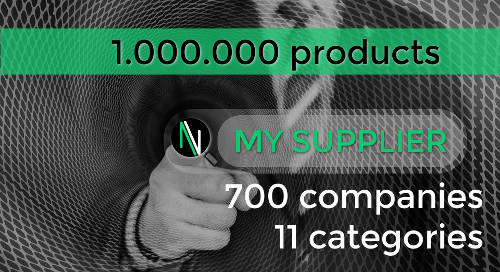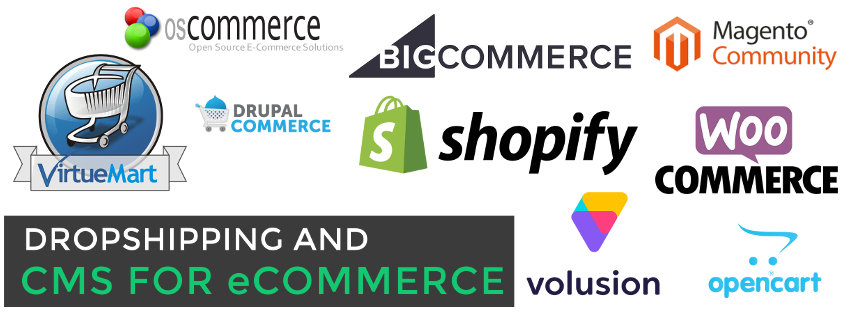
CMS for eCommerce in Drop Shipping
After planning your business and choosing your suppliers for your DropShipping, another important decision you will go to when opening your online store will be the choice of the sales platform. That is a difficult choice, considering the large number of different solutions available for cost, functionality and ease of use.
How can I sell my products in DropShipping?
Basically there are two ways to do this: eCommerce or marketplace (or maybe both).
In this guide I will talk about eCommerce and how you can create your own e-commerce or alternatively use a third platform.
What are the free CMS (Content Management System) for selling my products in DropShipping?
Let's immediately dispel a myth: there are no low-cost eCommerce or even at no cost.
It is true that with dropshipping you will have many costs minimized, but put in a quote that between structural costs (offices / collaborators / IT etc), SEO, marketing, catalog update, management promotions, blogs, social, mail marketing, suppliers orders, management of purchases, shipments, post sales, customer care, etc. .. to think of spending little or nothing on the design and construction of the site is the most wrong idea and could even be counterproductive in the long run because the site must be scalable (ie being able to grow without problems) and manage hundreds of daily orders and / or extensive depth catalogs.
Last but not least, your site must be secure for payments (SSL), which can be integrated with company management and mail marketing software of any size and customized as much as possible with advanced marketing automation or analytics software.
In short, all this has a cost, but today is the basis for adequately addressing the broad competition that you will find in any industry.
It is obvious that if a business is bankrupt because badly thought, it will not sell thanks to the more evolved and expensive eCommerce platform, so the CMS is only a part of your project and your tools.
The CMS or eCommerce platform that you choose will not have to be more than 10/15% of your entire budget!
In any case, almost all open source CMS can be downloaded free of charge from the internet, however their personalization will require specific technical skills and a more or less variable financial disbursement based on the functions to be equipped and if these are included in the CMS itself. or are made by third-party companies.
The same graphics of CMS (or the final graphics of your store) can be created from scratch or purchased as made by third parties and so on.
If you do not have particular technical experience, consider the idea of relying on an agency that will guide you on your commercial path to avoid wasting time and money and then starting in the wrong way.
One of the first things to know, however, is that the categories of platforms can be divided into three main macro-categories, each of which has advantages and disadvantages.
Let's see what are the main types in which it is possible to group the vast and heterogeneous world of CMS platforms.
Open source eCommerce platforms
These are CMS platforms characterized by the fact that the source code is made available free of charge by the developer community. This means that anyone can freely modify the code to adapt it to their needs of use.
In practice, the eCommerce platform can be downloaded for free and can be installed at your own hosting / vps / server and is completely customizable. It is possible to implement templates, components and plugins by taking them into account (usually paid) to increase their functionality.
Advantages
The main advantages of this type of eCommerce solutions are:
- the core of the platform (as well as numerous modules, templates and plugins) is free
- personalization thanks to the "open source" code allows a wide versatility
- large support communities usually made up of volunteers, offer free solutions to the problems encountered in no time
- the freedom of migration is almost guaranteed as with such solutions you are not bound to any agency, just contact any developer who is familiar with the development language used by the specific platform
Disadvantages
The main disadvantages of this type of solution are:
- the learning time is not short for both users and developers because open source CMS is often used occasionally by large agencies
- platform continuously updated to cover the countless bugs and malfunctions. These updates force the developer to constantly monitor and update the platform
In which cases they are recommended
This type of solution is recommended in cases of medium complexity, ie small / medium companies that do not intend to reserve large investments immediately.
Here are some examples
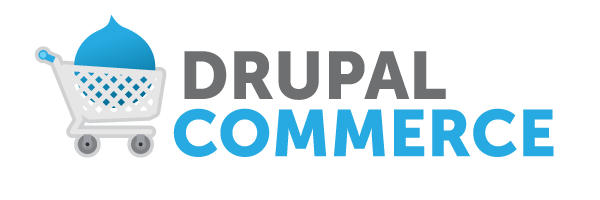
Drupal is not really a CMS born for eCommerce, but with the eCommerce plugin it's able to get on top of this list.
The strength of Drupal is its versatility, it is structured in such a way as to be able to adapt to many situations in an excellent way.
Advantages- Maximum customization
- Lots of documentation available, one of the largest open-source online communities
- Therefore the philosophy of publication and management of generalist contents is not born as eCommerce, sometimes it is difficult to consult the product catalog.
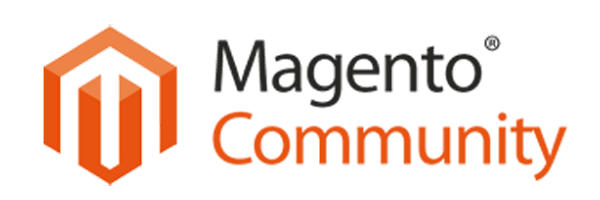
Magento is the most used solution, it is excellent for companies that need a professional online store. It is divided into two versions: Community and Enterprise
Magento Community Edition is free, but the Enterprise license can cost up to $ 12.990 a year. In return, many additional features and a 24 hour support are obtained.
However, the minor version or the Magento Community Edition is a feature-rich eCommerce platform. It allows users to customize the content, design and features of their online store with such ease. You can change the source code and install various extensions (whether paid or not) from Magento Connect. It also features an intuitive administration panel with the help of which you will be able to manage a number of essential elements: shipping and payment methods, coupons, discounts, etc.
Magento Community Edition does not provide any official technical support. However, it is still very useful for small businesses that want to manage their online store without spending money. Some esteemed companies like Samsung, Stussy, Nespresso and The North Face manage their own store with the help of Magento Community Edition.
The cost and the high customization make it an excellent solution for large companies.
Advantages- Extreme simplicity of installation
- On average, development and maintenance are quite expensive
- The performances can be decidedly erratic in case of "improvised developments"
- Except for certain sections, the back office is too confusing In its "normal version" (without plugins or ad-hoc developments) the product loading phase requires too much work and is decidedly slow. Furthermore, the management of the variants is very bad

OpenCart is one of the youngest products on the market, does not require great computer skills, is a robust eCommerce solution and oriented to search engines. Includes thousands of high quality eCommerce themes. With OpenCart it is extremely easy to create a feature-rich online store in just a few steps: just install it, choose the theme, add products and start selling.
It features a visually appealing administration interface that helps you take complete control of your online store.
With OpenCart you will receive assistance and free software updates for life. The best thing is the integrated order management and support for over 8 shipping methods and over 20 payment gateways. In addition, you can improve the functionality of your store by adding extensions from the extension directory.
Advantages- Extreme simplicity of installation
- Little extendable
- Little oriented to medium / large size realities

Prestashop is an easy-to-use open source eCommerce platform that incorporates multiple functions plus a rich store of additional modules, to integrate applications for every need.
It has no costs related to licenses on the core (in the sense that the CMS has no fee, although there are additional modules that improve or introduce advanced features for which you need to pay a license, even if one-off).
Being a system developed ad hoc for eCommerce has all the characteristics necessary for the customer (eg product comparison, in-depth analysis, related products, similar products, check out without registration, etc.) and to the operator who manages it (managing invoices, returns , shipping costs with various criteria, payments by bank transfer, credit card, cash on delivery, sales analysis, etc.).
Advantages- Simple installation
- Very light and performing core
- Many default features implemented
- Very limited and expensive level of customization
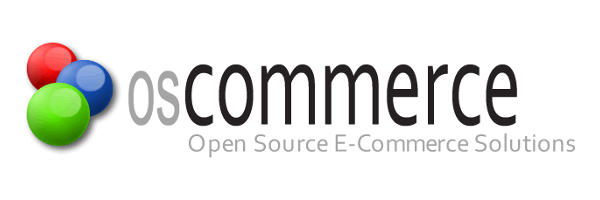
OsCommerce is among the first open source platforms born to create an eCommerce site, it was launched in 2000 in Germany. Today its community is home to over 270,000 members.
It is characterized by the offer of around 7,000 add-ons that make it powerful and flexible.
Its main advantage is versatility, but we must not forget that, compared to other more recent eCommerce software, it has had some security problems and, in some cases, makes it difficult to separate data, structure and contents.
Advantages- Very light and performing core
- Good level of customization
- Broad support community
- Various security problems
- Graphics tendentially obsolete and difficult to modernize

Virtuemart is well known as one of the best eCommerce management software thanks to its ease of use and excellent management of attributes and specifications.
Generous and flexible administration, as well as the site, clear and intuitive. Its community is very large, always active and available.
Advantages- The native integration with joomla makes it suitable for the realization of many different solutions
- Very light and performing core
- Thousands of extensions available for free
- Low customization costs
- Many features are to be integrated separately, making updates particularly delicate
- A lot of updates
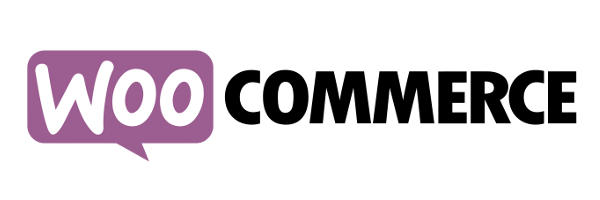
Woocommerce is designed for small and medium businesses that sell online and is currently Builtwith , the most used eCommerce platform on the web with over 1 million active installations and a total of over 20%.
Advantages- Highly customizable, it has no limits of any kind except the imagination and skill of the developer
- Extremely flexible from the graphical point of view: there are many themes suitable for any type of eCommerce
- The "raw back office" is clear enough and easy to use with very little training
- It requires a lot fo work and is difficult to manage
- Management and maintenance must be performed by competent personnel (frequently)
We have therefore seen a small rundown of possible choices of free open source CMS, however it should be noted that in order to keep your store reliable and functional, it is important that the CMS chosen has the support of a very wide and available community.
The use of "abandoned" CMS would not only complicate security updates and the various implementations they necessarily need.
Precisely for this reason, minors have been deliberately discarded from this list because they are considered no longer up to standard.
But if you do not have technical knowledge or do not want to rely on the case to manage your store, what options do you have?
Saas eCommerce platforms (Software as a service)
The so-called "hosted platforms" are the equivalent of a shop located within a commercial rental fund. In practice, the hardware infrastructure on which the site is based is owned by third parties (ie the service provider) and physically resides on the provider's server machines (which "hosts" the site).
These types of platforms are often referred to as Software as a Service (SaaS) because they are features that are instead outsourced by a service provider rather than purchased as a tangible asset.
Advantages
The main advantage of Saas eCommerce platforms is represented by the possibility of making its own financial investment modulable. Instead of immediately making a major investment to buy an eCommerce site, you only pay a monthly fee, with the possibility of seeing over time if the activity takes off and, if necessary, increase the required payment later.
Another advantage is represented by the fact that, for usually modest figures, it is possible to choose between almost complete solutions without the need to resort to expensive interventions by developers and experts.
Disadvantages
Logical and inevitable if it costs little and is already ready, of course, the possibilities of customization are extremely limited compared to the other types of solution.
In which cases they are recommended
The hosted platforms are ideal for startups and online realities with little budget available. In fact, they allow those who are beginners or have few capital to see how the situation evolves, without bind immediately to an important investment that would in this case be excessively risky.
However some of them are also proposing themselves as partners for large commercial companies, proposing customized solutions.
Here are some examples
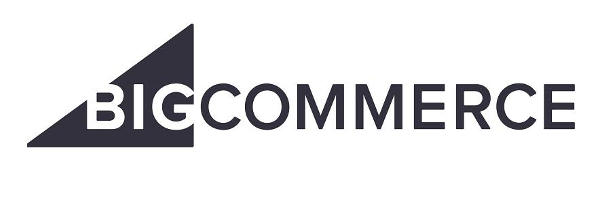
BigCommerce is a very sophisticated CMS platform able to grow the sales of your ecommerce, optimize the performance of your business and enter new channels. It's the perfect solution for promising brands that want to grow fast. In fact, the eCommerce business using BigCommerce sees average revenue growth of 28% year on year, almost twice as much as traditional eCommerce.
Rich in solutions and functionality, it offers excellent support especially to small and medium-sized businesses that want to grow more and more and expand the limits of their business. With BigCommerce you can integrate the sale of products on sites like Amazon or Ebay. In addition, the platform offers you secure hosting channels, unlimited storage and space, maximum bandwidth and many other easy-to-use features. All without transition costs.
With BigCommerce you can customize your online store as much as possible, because it offers you the possibility of integrating hundreds and hundreds of Apps that simplify your daily operations, increase sales and personalize your e-commerce. In addition, most of these apps can be installed with just one click directly from the control panel. All in a simple, convenient and fast way.
Advantages- Simple, fast, immediate; you do not have to worry about managing hosting, everything is included and quality
- Simplified SEO optimization
- Easily connected with third-party software (marketplace, newsletter, ERP, PLM, CRM, warehouse and administration management, marketing automation, payment systems)
- Continuous innovation and improvement of the platform
- Quick learning of the platform management
- Limited for large companies that need a Tailor-made eCommerce

Storeden is a platform designed for small and medium-sized companies that want to tackle online sales by using a tool that is easy to implement, easily modifiable, easily integrated with third-party software, easily linked with its warehouse management system and with company management tools.
Storeden foresees that we can also work with a very strong personalization. Complete control of HTML, CSS and JS allows you to have a truly unique product. You can use the themes already present, but it is not at all complicated to create your own theme, pushing the customization well beyond the modification of the logo, main colors and typography.
Storeden is not just a platform for managing an online store, it is an integrated system for managing sales on multiple channels and for creating a site that is effectively the bridge of a company's online presence.
Advantages- Simple, fast, immediate; you do not have to worry about managing hosting everything is included and quality
- Simplified SEO optimization
- Easily connected with third-party software (marketplace, newsletter, ERP, PLM, CRM, warehouse and administration management, marketing automation, payment systems)
- Continuous innovation and improvement of the platform
- Very fast learning of the platform management
- Limited for large companies that need a Tailor-made eCommerce
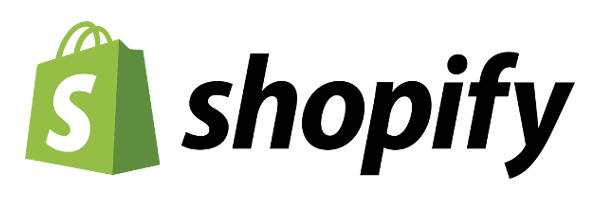
Shopify is a great software to create eCommerce. Simple, fast, effective and intuitive. It has all the characteristics to be one of the best CMS used for the construction of eCommerce.
Shopify has a really simple and intuitive interface. In a few clicks you have built your new online store, you can upload new products and update stocks quickly and then has a great advantage: there is a smartphone app where you can manage your e-commerce wherever you are, check statistics and earnings in real time.
It is no coincidence that currently 10% of the best 10'000 eCommerce in the world are based on Shopify and not on Prestashop, Magento or on the widespread WooCommerce.
Shopify is the ideal solution for those who plan to take the first big step in the eCommerce world because it allows a gradual approach, relatively cheap and with top performance.
Advantages- Hosting is not an unknown quantity. Everything is based on Shopify's servers that are always efficient and reliable
- The backoffice is extremely simple to use with significant time savings for product loading, promotion and order management
- This is the cheapest solution both for development costs and for maintenance costs
- Once completed, eCommerce is always efficient, drastically reducing developer intervention
- Backoffice not translatable into other languages (but being simple, it does not represent a big problem)
- Whatever the chosen monthly subscription plan (24, 64 or 240 euros), a small fee is expected (2.0 / 1.0 / 0.5 percent) on each individual sale
- There are not many developers willing to create eCommerce and customizations for Shopify
- Limited for large companies that need a Tailor-made eCommerce

Volusion is an American software house founded in 1999 and recently its eCommerce software has been judged as the best platform to create an eCommerce site and with the best security system on the market.
With plans and prices roughly on par with Shopify (ranging from $ 15 / month to $ 135 / month but without commissions on sales) and many features to match including hundreds of modern and responsive themes, Volusion is certainly one of the best alternatives to Shopify.
Advantages- Fast, easy and intuitive to use. Everything is based on efficient and secure proprietary servers.
- Perfectly integrated with all marketplaces and social networks
- Best security system on the market
- Support 24 hours via email, chat and phone
- Lots of free templates
- No sales commissions
- Limited for large companies that need a Tailor-made eCommerce
Custom eCommerce platforms
These are the ecommerce platforms developed internally by various web agencies that deal with ecommerce sites. They are characterized by the fact that the relative source code is owned by the web agency and is therefore not freely downloadable / modifiable.
Advantages
A CMS developed internally by the agency you address offers the highest possible level of customization. Furthermore, the agency's internal staff provides the highest possible level of support on this platform, since each web agency knows its own product from A to Z.
Disadvantages
If you rely on a custom platform you are inevitably linking to its developer. If you decide to change your agency in the future, you may encounter considerable difficulties: you can transfer the site, but not the relevant know-how, and you can be sure that the new agency will hardly take the trouble to learn to use another developer's platform.
In which cases they are recommended
They are especially recommended for large and complex ecommerce sites, which usually correspond to high-budget projects. In this case, the amount of the investment is less important than the actual personalization needs.
Conclusions
In conclusion you will have seen that there is no perfect solution. In almost all cases it depends on the size of the business and the budget that you intend to dedicate to your e-commerce. Moreover, if you intend to use a particular CMS more than another you must also evaluate the staff who will manage it and then opt for a weighted choice rather than dictated by the "fashion" of the moment.




